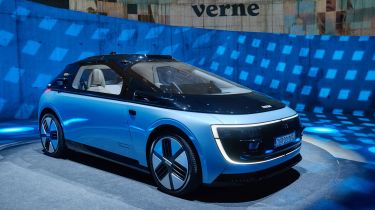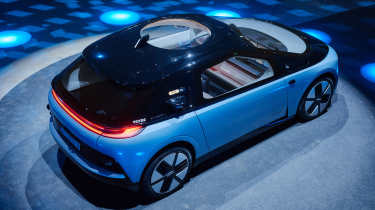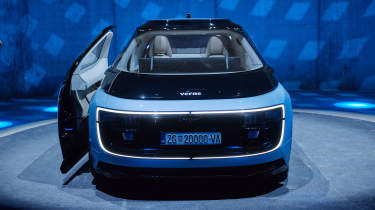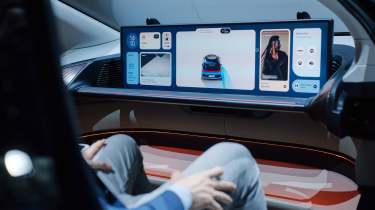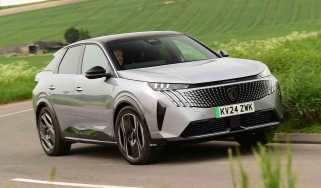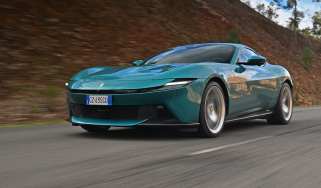Rimac Verne robotaxi: inside the taxi cab of the future
Verne might not take you around the world in 80 days, but it could be ferrying you around Manchester. We check it out
The taxi of the future is a luxuriously spacious, two-seat, self-driving electric vehicle that will be hailed using a smartphone app from a ‘mothership’ facility in a city near you – if your nearest city is Manchester, at least.
Verne is the name of a Croatian mobility tech start-up founded by electric car entrepreneur Mate Rimac and two of his long-time Rimac Group colleagues: Marko Pejković, now the chief executive of Verne, and Adriano Mudri, the designer of Rimac’s Nevera supercar and now chief design officer for Verne.
We’ve flown out to Zagreb, home to the impressive new Rimac Automotive technology ‘campus’, for our first look at this new robot taxi, as well as the infrastructure and service model that could be operating in Manchester some time after 2026. Why Manchester? Because although the Verne concept has only just been publicly revealed, the city’s planners have been talking with Rimac since before Covid about a project to launch its self-driving, ride-hailing service, and council officials have agreed in principle for Manchester to be the second live roll-out site for Verne vehicles, after they hit the streets in Zagreb, Croatia.
You’ll order a ‘Verne’ in much the same way as you order an ‘Uber’ today, but instead of waiting for a rattly old Toyota Prius to turn up, you’ll be getting a smart vehicle with comfy armchairs, more space than a Rolls-Royce, climate, sounds and lighting settings preconfigured to your tastes, and your choice of onboard entertainment options via large screens on the dashboard. And while the Verne’s exterior is not too radically different from other vehicles on the road, it has a suitably futuristic appearance with what designer Mudri calls “a smooth, encircling, spaceship-like canopy on top with an elegant and solid lower body”.
We’re not allowed to experience any self-driving at this launch event, but we can try out the launch prototype’s cabin, where the space-age effect is reinforced by the absence of a steering wheel and pedals.
Passengers step into the two-seat interior – which boasts more legroom than your average limousine and a unique ‘halo’ sunroof with rounded edges for panoramic cityscape views – and start and finish their journey using a touchpad that is located between the chairs. They can use the touchscreen for journey information or to alter the vehicle’s settings, although Verne promises that customers will also be able to personalise a taxi’s settings prior to its arrival via the app, including variables such as interior lighting, temperature and even scent.
If you think it all sounds a little far-fetched, the Verne founders beg to differ. They’re on course to roll-out the first Verne program in Zagreb as early as 2026, and say contracts have been signed with other cities in the UK and Germany, along with Manchester. The company has also started work on a new manufacturing complex for its vehicles in southern Croatia. It’s a stand-alone operation from the Rimac Group, which is variously responsible for the Rimac Nevera electric hypercar, the latest Bugatti Tourbillon, plus battery assemblies for several car manufacturers around the world – so Verne won’t share the facilities at the Rimac Campus.
While the UK government recently enacted laws enabling self-driving vehicles to be used on the road, the self-driving technology underpinning Verne, which is developed by US-listed firm MobilEye, is not ready to be fully unleashed on an unsuspecting public. That being the case, the initial projects will be limited to defined and controlled areas where the cars are deemed safe to use, and it’s possible that Verne will be rolled out by cities in certain areas accompanied by other measures to control, reduce or even eliminate private-car traffic.
Transport for Greater Manchester’s senior innovation officer Sam Li told us: “We’re trying to understand exactly how Verne will be integrated; more work is required from UK regulators around vehicle accreditation and certification. We want to make sure it enhances the investment we’re already making in public transport infrastructure.
“It’s about choosing the right mode for the right purpose and one consideration is the night-time leisure economy, where this may provide a more economic efficient solution,” Li explained.
Verne was named after the celebrated French author Jules Verne – the writer of classics such as Around the World in 80 Days, Journey to the Centre of the Earth, and Twenty Thousands Leagues Under the Seas – who the company says “imagined humanity’s potential through amazing journeys”, and it’s not just about a vehicle, but “an Urban Autonomous Mobility Ecosystem consisting of three elements; vehicle, app and ‘the mothership’”.
These motherships will be specialised infrastructure installations, where Verne vehicles will be recharged, inspected, cleaned and maintained daily, to ensure customers always travel in clean and safe vehicles, the company promises. The first mothership will be constructed in Zagreb next year, along with the new factory for large-scale production of autonomous vehicles that can be deployed worldwide.
After Zagreb, Manchester and German cities will follow, and Verne says it has already signed agreements with 11 cities across the EU, UK and Middle East, with 30 others in negotiations. Verne lists the benefits of its products as economic and social, allowing planners to reduce city-centre car usage, free up traffic lanes and parking spaces, and create more space for people. Verne also aims to positively impact the environment by reducing the number of cars needed.
“At Verne, we believe it’s not about being the first, but about creating the perfect customer experience,” says Rimac. “Every customer will have a better service than the best mobility service enjoyed by the very rich, through the service that is affordable for all. You will have a safe and reliable driver, a vehicle with more interior space and comfort than the best limousines today, and a service that will be tailored to your needs in every possible way.”
Importantly, too, Verne is a ‘turn-key’ operation that will cover its own costs for installation, and run and maintain the service going forward – a welcome feature for cash-strapped councils planning transport policy.
Some may question the decision to build only a two-seater, but Mudri reckons that data shows nine out of 10 rides taken in existing taxis are for only one or two people. “We can satisfy most trips with a two-seater and create unmatched interior space in a compact-sized vehicle,” Rimac adds. “Sliding doors were designed not to obstruct traffic flow around the vehicle, while still arriving in style. Once inside, passengers can stretch out their legs and get super-comfortable. We wanted to make the interior less automotive and more like a living room.” To that end, the dashboard, steering wheel and pedals are replaced by an ultra-wide 43-inch display and 17-speaker audio system.
That said, the visionary future of Verne mobility extends well beyond the city limits, as revealed at the recent launch party, where computer renderings were shown of possible variations including a svelte four-seater for longer-distance city-to-city trips, and even a funky self-driving SUV off-roader.
In the shorter term, though, Rimac says aspirations are more modest. “Utilization will not be like 5 per cent like a normal car, but rather 40, 50, 60 per cent, so one of these cars replaces many others,” he explains. “When rolling out to the city, you need a critical mass of cars to make the service available and not make people wait. For a city like Zagreb, to be the dominant player you need maybe a thousand or so, but our initial goal is a couple of hundred.”
Now check out our list of the cheapest electric cars...
Find a car with the experts

